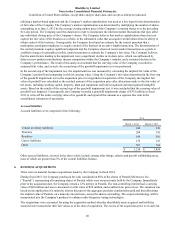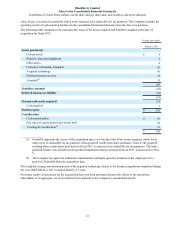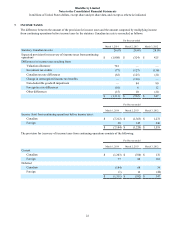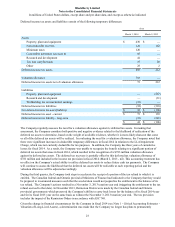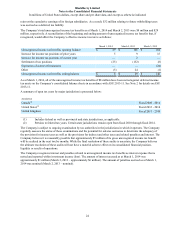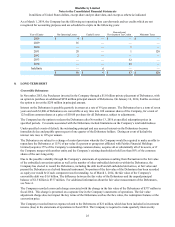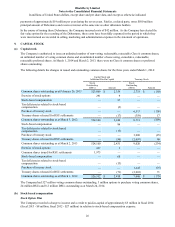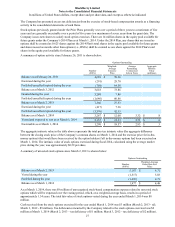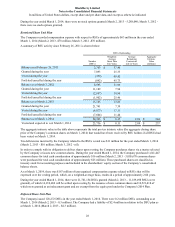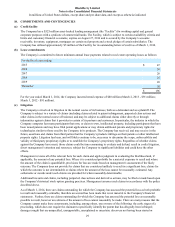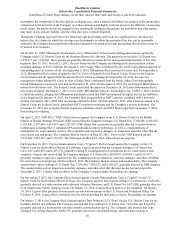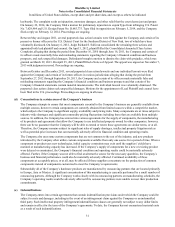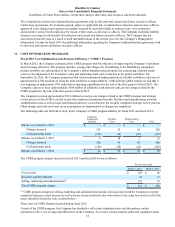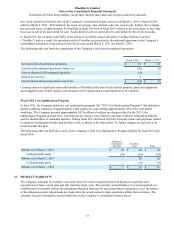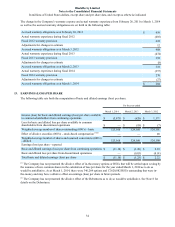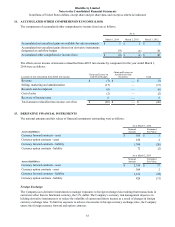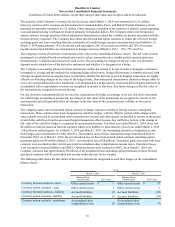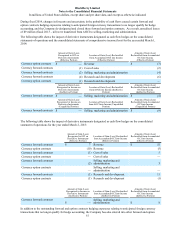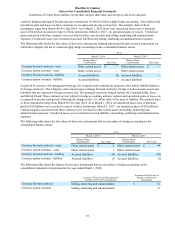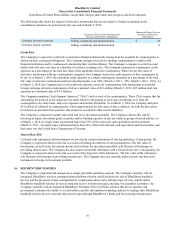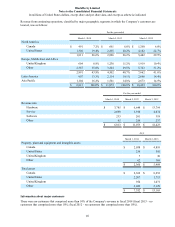Blackberry 2014 Annual Report Download - page 119
Download and view the complete annual report
Please find page 119 of the 2014 Blackberry annual report below. You can navigate through the pages in the report by either clicking on the pages listed below, or by using the keyword search tool below to find specific information within the annual report.BlackBerry Limited
Notes to the Consolidated Financial Statements
In millions of United States dollars, except share and per share data, and except as otherwise indicated
30
incomplete; the complexity of the facts that are in dispute (e.g., once a patent is identified, the analysis of the patent and a
comparison to the activities of the Company is a labour-intensive and highly technical process); the difficulty of assessing
novel claims; the parties not having engaged in any meaningful settlement discussions; the possibility that other parties
may share in any ultimate liability; and the often slow pace of patent litigation.
Though the Company does not believe the following legal proceedings will result in a significant loss, and does not
believe they are claims for which the outcomes are determinable or where the amounts of the loss can be reasonably
estimated, the Company has included the following summaries of certain of its legal proceedings that it believes may be
of interest to its investors.
On October 31, 2008, Mformation Technologies, Inc. (“Mformation”) filed a patent infringement lawsuit against the
Company in the U.S. District Court for the Northern District of California. The patents in suit include U.S. Patent Nos.
6,970,917 and 7,343,408. These patents are generally directed to remote device management functionality. A jury trial
began on June 19, 2012. On July 13, 2012, the jury found that the Company had infringed the asserted patent claims,
awarding damages of $147.2 million. On August 8, 2012, Judge Ware overturned the jury verdict and granted judgment of
non-infringement as a matter of law. On September 5, 2012, Mformation filed a motion for a new trial. On September 6,
2012, Mformation filed a notice of appeal to the U.S. Court of Appeals for the Federal Circuit. However, the Federal
Circuit deactivated the appeal while the motion for new trial was pending. On September 20, 2012, the case was
reassigned to Judge Edward M. Chen, in view of Judge Ware’s retirement from the bench. Judge Chen subsequently
denied Mformation’s motion for new trial on November 15, 2012. On December 4, 2012, the court denied Mformation’s
motion for relief from costs. The Federal Circuit reactivated the appeal on December 20, 2012 after Mformation filed a
new notice of appeal. On January 3, 2013, a new entity, Mformation Software Technologies, Inc. (“MST”), filed a motion
to substitute parties, alleging that Mformation had dissolved and that MST had assumed the rights, but not the liabilities,
to the litigation. On January 14, 2013, the Company filed an opposition to MST’s motion, combined with a motion to
dismiss. On April 8, 2013, MST filed its opening substantive brief. On November 21, 2013, after a limited remand to the
District Court, the Federal Circuit denied both MST’s motion to substitute and the Company’s motion to dismiss. On
December 23, 2013, the Company filed its responsive substantive brief, and MST filed a reply brief on January 9, 2014.
Proceedings are ongoing.
On April 2, 2012, NXP B.V. (“NXP”) filed a lawsuit against the Company in the U.S. District Court for the Middle
District of Florida (Orlando Division). NXP asserted that the Company infringes U.S. Patent Nos. 7,330,455; 6,434,654;
6,501,420; 5,597,668; 5,639,697; and 5,763,955. NXP alleges that its patents are generally directed to certain wireless
technologies including 802.11 standards GPS and embedded memory technology, as well as certain methods of
manufacture for semiconductor devices. The complaint seeks monetary damages, an injunction, and other relief that the
court deems just and proper. The Company filed its Answer on May 30, 2012. Prior to trial, NXP dropped patents
5,597,668; 5,639,697; and 5,763,955. The trial began on March 24, 2014. Proceedings are ongoing.
On September 10, 2013, Cypress Semiconductor Corp. (“Cypress”) filed a lawsuit against the Company in the U.S.
District Court for the Northern District of California. Cypress asserted that the Company infringes U.S. Patent Nos.
6,012,103; 6,249,825; and 6,493,770, generally relating to reconfiguration of a peripheral device connected to a host
computer. Cypress also asserted that the Company infringes U.S. Patent Nos. 8,004,497; 8,059,015; and 8,519,973,
generally relating to capacitive touchscreens. The complaint seeks an injunction, monetary damages, and other relief that
the court deems just and proper. On November 4, 2013, the Company filed an answer and counterclaims. The Company
asserted that Cypress infringes U.S. Patent Nos. 7,834,586, 7,986,127, and 8,169,187, generally directed to USB charging.
The counterclaims seek an injunction, monetary damages, and other relief that the court deems just and proper. On
December 2, 2013, Cypress filed an answer to the Company’s counterclaims. Proceedings are ongoing.
On November, 4, 2013, the Company filed a lawsuit against Cypress Semiconductor Corp. (“Cypress”) in the U.S.
District Court for the Northern District of Texas. The Company asserted that Cypress infringes U.S. Patent No. 6,034,623,
generally directed to a radio modem with radio and telemetry functions, and U.S. Patent No. 6,833,686, generally directed
to an adaptive rate battery charging circuit. On January 13, 2014, Cypress filed an answer to the complaint. On January
30, 2014, Cypress filed petitions for inter partes review for both patents in the U.S. Patent and Trademark Office. On
February 4, 2014, Cypress filed a motion to stay the lawsuit pending the inter partes reviews. Proceedings are ongoing.
On January 3, 2014, the Company filed a lawsuit against Typo Products LLC (“Typo”) in the U.S. District Court for the
Northern District of California. The Company asserted that Typo infringes U.S. Patent Nos. 7,629,964, and 8,162,552,
generally directed to a keyboard for use with a mobile communication device. The Company also asserted that Typo
infringed U.S. Design Patent No. D685,775, generally directed to a keyboard design, and trade dress relating to


